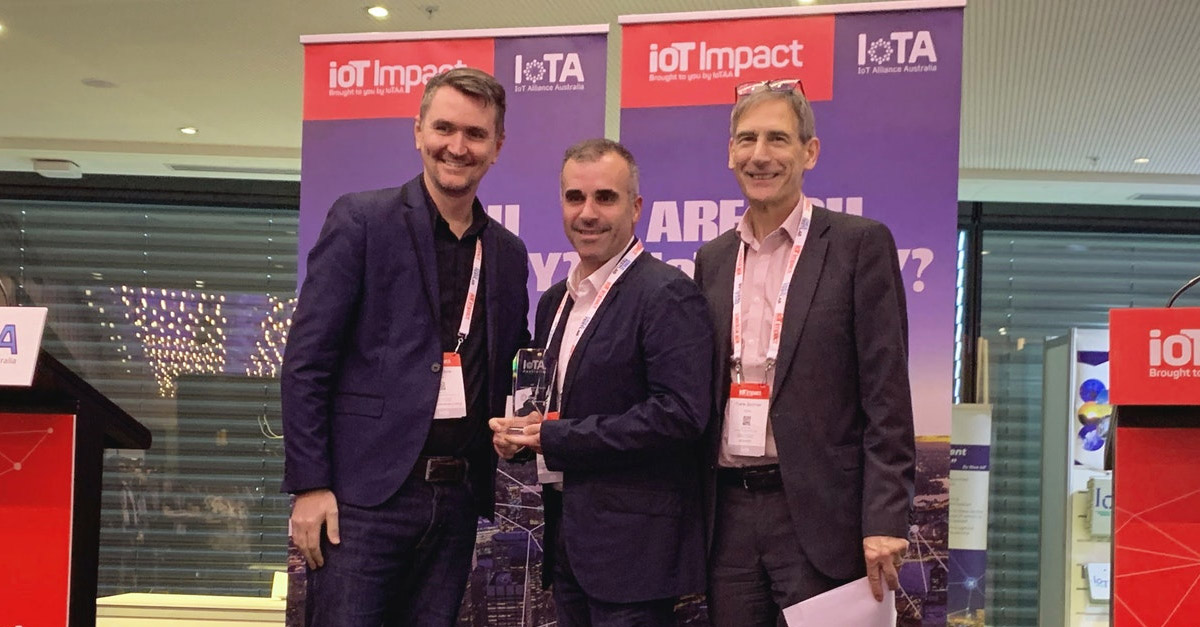DiUS is proud to recognise and congratulate our long-standing and multi-award-winning partner Environmental Monitoring Solutions (EMS) following the company’s most recent success at this year’s IoT Impact Awards in Sydney.
EMS, a specialist provider of solutions for petrol retailers to gather and analyse data on the performance of their petrol station, won the ‘Industry Impact’ category in the IoT Alliance Australia’s IoT Impact award series for its world-class IoT-enabled platform Fuelsuite.
The IoT Impact Awards highlight the innovative work that Australian companies are doing in IoT. Specifically, the ‘Industry Impact’ award category recognises IoT-enabled solutions that demonstrate new business models and significant new benefits.
Fuelsuite is an IoT, cloud-based data platform and web application that provides a unique and first of its kind monitoring and reporting solution specifically for retail fuel businesses.
The IoT Impact Awards win means that EMS and DiUS have now received six awards in recognition of the innovative and impactful solution.
2019: EMS, winner, IoT Impact Awards, Industry Impact category.
2019: EMS, finalist, Premiers’ Sustainability Awards, Environmental Protection category.
2019: DiUS, finalist, ARN Innovation Awards 2019, Emerging Technology – IoT category.
2018: DiUS, winner, CRN Impact Awards 2018, Digital Transformation category.
2018: EMS, winner, Australian IoT Awards, Secondary Industry category.
2017: EMS, finalist, Australian IoT Awards, Professional Services category.
2017: EMS, finalist, Premiers’ Sustainability Awards, Innovation category.
DiUS has been EMS’ innovation partner since 2015. We designed and developed custom software and hardware for Fuelsuite that supported EMS to achieve its vision to disrupt entrenched competition and reinvent data collection processes, ultimately unlocking real-time high definition data for clients’ benefit. And just as important as delivering a dramatic improvement in efficiency, EMS’ wanted to improve a petrol station’s ability to minimise environmental impacts.
“Our relationship with DiUS started in 2015, based on word-of-mouth recommendations commending DiUS’ experience in the IoT space. DiUS specialists quickly demonstrated why they are so deeply trusted in the technology scene.”
“Having worked shoulder-to-shoulder since then, taking Fuelsuite from creation to scale, DiUS is embedded as a valued and indispensable part of our family. We will continue collaborating to deliver on our vision; blending technology and service to provide a more sustainable future for those that come next. DiUS is our trusted technology and innovation partner.”
Mr Russell Dupuy, Managing Director EMS
Fuelsuite enables EMS’ customers to manage petrol stations proactively rather than reactively. A custom-built physical device that collects data from sensors, regardless of the configuration, in the stations’ underground tanks and pumps at 30-second intervals. The data is then wirelessly transmitted to the AWS cloud, where it gets processed and delivered via a web-based dashboard.
Greater efficiency and profitability is driven by reducing maintenance spend, earlier detection and resolution of fuel leak incidents and reduced fuel variance. EMS’ customers currently gain an estimated 500 percent return on the annual costs of the cloud and IoT–enabled solution.
And Fuelsuite delivers important environmental and WHS benefits by:
- Detecting fuel leaks from underground tanks early minimising environmental impacts and clean up costs.
- Preventing the overfilling of tanks to minimise the risk of explosions and contamination of waterways.
- Removing the manual measurement of underground tank levels by the fuel tanker operator on the forecourt to minimise the chance of being hit by a vehicle.
Launching in Australia with Viva Energy, and expanding internationally, EMS has rolled Fuelsuite out to thousands of retail, aviation and commercial fuel facilities, monitoring tens of thousands of sensors. In 2018 DiUS supported EMS to go global with Fuelsuite in New Zealand, with opportunities to rollout globally in 2019 across Malaysia, India and other parts of Asia.

